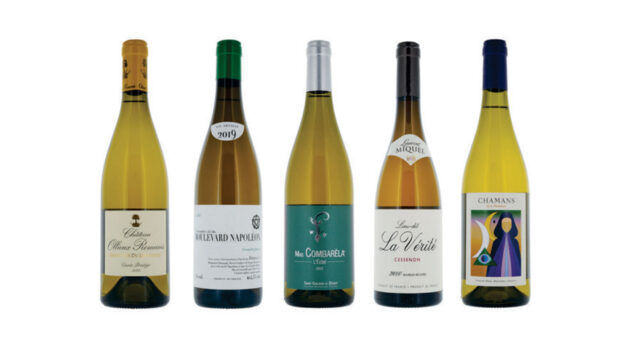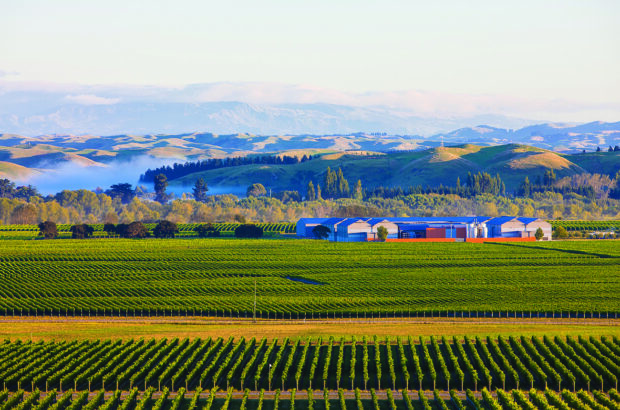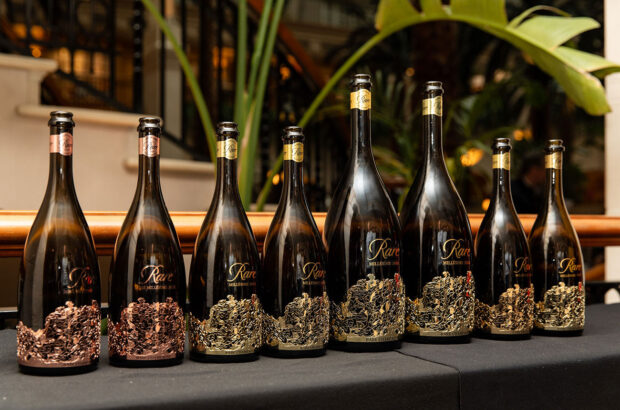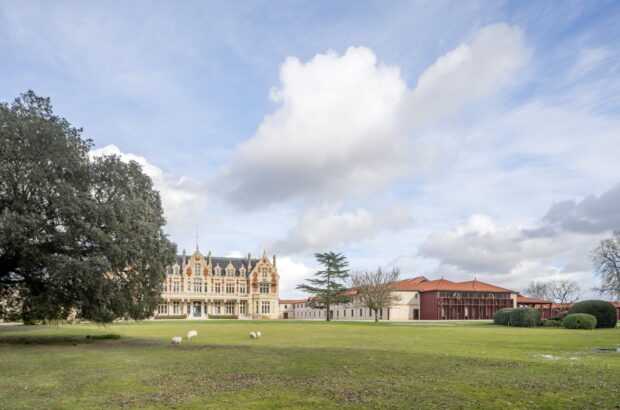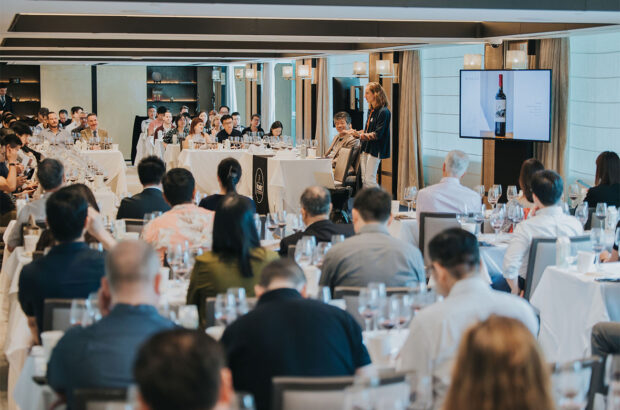Get to grips with the different appellations on this side of the Gironde, as Stephen Brook offers a comprehensive guide from north to south for anyone who is just beginning their love affair with Bordeaux wines...
As the terms Left and Right Bank clearly imply, what we think of as Bordeaux is in reality two different regions separated by the broad Gironde River. It’s not just geography that divides them. The Left Bank is, in its best terroirs, dominated by gravel banks, which Cabernet Sauvignon in particular finds accommodating. Across the river, the Right Bank is largely clay and limestone, where Merlot is more at home.
Yet even the Left Bank is far from homogeneous. Its numerous appellations are divided by location – it’s 130km from the northern Médoc to the southern Graves – and also by proximity to the river. Soil too plays a part: top sub-regions such as Margaux are a series of gravel mounds, while elsewhere gravel is sporadic at best. The role of gravel is twofold: it permits excellent drainage, a crucial factor in a maritime region, as it stores heat during sunny days and then releases it slowly after sundown, encouraging the ripening process.
Scroll down to see Brook’s selection of classic tastes from the Left Bank
The city of Bordeaux is at the region’s centre. Within the city itself, and for some distance to the south, is the Graves, home to the Left Bank’s oldest properties. To the north lies the Médoc, home to the Left Bank’s most prestigious sub-regions: Margaux, St-Julien, Pauillac and St-Estèphe. Almost all the estates classified in 1855 lie within those communes, with just a few exceptions such as La Lagune, Cantemerle and Belgrave.
{"content":"PC9wPgo8aDI+TcOpZG9jPC9oMj4KPHA+VG8gdGhlIG5vcnRoIG9mIEJvcmRlYXV4IGNpdHksIHRoZSBNw6lkb2MgaXMgcmVkLXdpbmUgdGVycml0b3J5LCBkb21pbmF0ZWQgYnkgQ2FiZXJuZXQgU2F1dmlnbm9uIGFuZCBNZXJsb3QsIHdpdGggQ2FiZXJuZXQgRnJhbmMgYW5kIFBldGl0IFZlcmRvdCBwbGF5aW5nIHN1cHBvcnRpbmcgcm9sZXMuPC9wPgo8cD48ZGl2IGNsYXNzPSJhZC1jb250YWluZXIgYWQtY29udGFpbmVyLS1tb2JpbGUiPjxkaXYgaWQ9InBvc3QtaW5saW5lLTIiIGNsYXNzPSJpcGMtYWR2ZXJ0Ij48L2Rpdj48L2Rpdj48L3A+CjxwPlByb3BlcnRpZXMgd2l0aCBhIGhpZ2ggcHJvcG9ydGlvbiBvZiBNZXJsb3QsIHN1Y2ggYXMgUGljaG9uIExvbmd1ZXZpbGxlIENvbXRlc3NlIGRlIExhbGFuZGUgYW5kIFBhbG1lciwgbWFpbnRhaW4gdGhhdCBNZXJsb3Qgb24gdGhlIExlZnQgQmFuayBjYW4gZ2l2ZSBzdHJ1Y3R1cmVkIHdpbmVzIHdoaWNoIGhhdmUgbGl0dGxlIGluIGNvbW1vbiB3aXRoIHRoZSBmbGVzaGllciwgc2VkdWN0aXZlIHN0eWxlcyBvZiBNZXJsb3QgZnJvbSB0aGUgUmlnaHQgQmFuay48L3A+CjxwPlRoZXJlIGFyZSBhIGZldyB3aGl0ZSB3aW5lcyBtYWRlIGhlcmUsIHN1Y2ggYXMgQWlsZSBk4oCZQXJnZW50IGZyb20gTW91dG9uIGFuZCBQYXZpbGxvbiBCbGFuYyBmcm9tIE1hcmdhdXgsIHBsdXMgYXR0cmFjdGl2ZSBib3R0bGluZ3MgZnJvbSwgYW1vbmcgb3RoZXJzLCBQcmlldXLDqS1MaWNoaW5lIGluIE1hcmdhdXggYW5kIEZvbnLDqWF1ZCBpbiBMaXN0cmFjLiBCdXQgbW9zdCBwcm9wZXJ0aWVzIGFyZSB3ZWxsIGF3YXJlIHRoYXQgcmVkLXdpbmUgcHJpY2VzIG91dHN0cmlwIHRob3NlIGZvciB3aGl0ZXMgdG8gc3VjaCBhbiBleHRlbnQgdGhhdCB3aGl0ZSB3aW5lIHByb2R1Y3Rpb24gaW4gYSB0b3AgTcOpZG9jIHRlcnJvaXIgd291bGQgYmUgYW4gaW5kdWxnZW5jZS48L3A+CjxoMj5IYXV0LU3DqWRvYzwvaDI+CjxwPk9ubHkgYSBzbWFsbCBwcm9wb3J0aW9uIG9mIHRoZSB2aW5leWFyZHMgb2YgdGhlIE3DqWRvYyBhcmUgbG9jYXRlZCB3aXRoaW4gdGhlIGZvdXIgdG9wIGNvbW11bmVzLiBUaGUgcmVzdCBhcmUgZW50aXRsZWQgdG8gdGhlIGJyb2FkZXIgYXBwZWxsYXRpb25zIG9mIGVpdGhlciBIYXV0LU3DqWRvYyBvciBNw6lkb2MuPC9wPgo8ZGl2IGNsYXNzPSJhZC1jb250YWluZXIgYWQtY29udGFpbmVyLS1tb2JpbGUiPjxkaXYgaWQ9InBvc3QtaW5saW5lLTMiIGNsYXNzPSJpcGMtYWR2ZXJ0Ij48L2Rpdj48L2Rpdj4KPHA+VGhlIEhhdXQtTcOpZG9jIGV4dGVuZHMgZnJvbSB0aGUgbm9ydGhlcm4gZWRnZXMgb2YgdGhlIGNpdHkgdG8gdGhlIGFyZWEganVzdCBub3J0aCBvZiBTdC1Fc3TDqHBoZS4gTWFueSBleGNlbGxlbnQgcHJvcGVydGllcyBhcmUgZm91bmQgaGVyZSwgaW5jbHVkaW5nIGEgbnVtYmVyIG9mIGNsYXNzZWQgZ3Jvd3Rocy4gV2hhdCBkaXN0aW5ndWlzaGVzIHRoZSBwcmVzdGlnaW91cyBjb21tdW5lcyBpcyB0aGVpciBwcm94aW1pdHkgdG8gdGhlIHJpdmVyIGFuZCB0aGUgZGVwdGggb2Ygd2VsbC1kcmFpbmVkIGdyYXZlbCBzb2lscyBvbiB3aGljaCB0aGUgdmluZXMgYXJlIHBsYW50ZWQuPC9wPgo8cD5UaGUgSGF1dC1Nw6lkb2MgdmluZXlhcmRzIGp1c3QgbWlzc2luZyBvdXQgbGllIHNsaWdodGx5IHRvIHRoZSB3ZXN0IG9mIHRoZSB0b3AgcmVnaW9ucyBvbiBsYXRlci1yaXBlbmluZyBzb2lscywgb3Igb24gc29pbHMgd2l0aCBhIGxvdyBncmF2ZWwgY29udGVudCwgc3VjaCBhcyB0aGUgYXJlYSBiZXR3ZWVuIE1hcmdhdXggYW5kIFN0LUp1bGllbi4gVGhlIG9uZSBleGNlcHRpb24gaXMgYXJvdW5kIHRoZSBjb21tdW5lIG9mIFN0LVNldXJpbiwgd2hlcmUgYmVhdXRpZnVsbHkgbG9jYXRlZCBwcm9wZXJ0aWVzIHN1Y2ggYXMgU29jaWFuZG8tTWFsbGV0IGFuZCBDaGFybWFpbCBwcm9kdWNlIHdpbmVzIHRoYXQgY2FuIHNvbWV0aW1lcyByaXZhbCB0aG9zZSBvZiBTdC1Fc3TDqHBoZSwganVzdCB0byB0aGUgc291dGguPC9wPgo8ZGl2IGNsYXNzPSJhZC1jb250YWluZXIgYWQtY29udGFpbmVyLS1tb2JpbGUiPjxkaXYgaWQ9InBvc3QtaW5saW5lLTQiIGNsYXNzPSJpcGMtYWR2ZXJ0Ij48L2Rpdj48L2Rpdj4KPGgyPkFQIE3DqWRvYzwvaDI+CjxwPkNvbnRpbnVlIG5vcnRoIGFuZCB5b3UgZmluZCB5b3Vyc2VsZiBpbiBBUCAoZm9ybWVybHkgQUMpIE3DqWRvYy4gVGhpcyBpcyB0aGUgbW9zdCBub3J0aGVybHkgcGFydCBvZiB0aGUgcGVuaW5zdWxhLCBhbmQgcmlwZW5pbmcgY2FuIGJlIHByb2JsZW1hdGljIGluIGNvb2xlciBvciB3ZXR0ZXIgeWVhcnMuIE5vciBhcmUgdGhlIHNvaWxzIGFzIHByb3BpdGlvdXMgYXMgZnVydGhlciBzb3V0aCwgdGhvdWdoIGdyYXZlbCBpcyBub3QgZW50aXJlbHkgYWJzZW50LjwvcD4KPHA+VGhlIGFyZWEgaXMgY2VydGFpbmx5IGNhcGFibGUgb2YgcHJvZHVjaW5nIGV4Y2VsbGVudCB3aW5lcyBzdWNoIGFzIFBvdGVuc2FjLCBk4oCZRXNjdXJhYywgTGEgVG91ciBkZSBCeSwgTG91ZGVubmUgYW5kIFRvdXItSGF1dC1DYXNzYW4sIGJ1dCBxdWFsaXR5IHZlcnkgbXVjaCBkZXBlbmRzIG9uIGluZGl2aWR1YWwgbG9jYXRpb24gYW5kIG9uIG1haW50YWluaW5nIG1vZGVyYXRlIHlpZWxkcy4gQmVjYXVzZSB0aGUgb3duZXJzIGNhbm5vdCBkZW1hbmQgcHJpY2VzIGFueXdoZXJlIGNsb3NlIHRvIHRob3NlIGNvbnNpZGVyZWQgbm9ybWFsIGluIFN0LUp1bGllbiBvciBNYXJnYXV4LCB0aGUgaW5hYmlsaXR5IHRvIGludmVzdCBpbiB0aGUgY2F1c2Ugb2YgaW1wcm92aW5nIHF1YWxpdHkgZnVydGhlciBpcyBhbiBhZGRpdGlvbmFsIGZhY3Rvci4gQnV0IGluIGdyZWF0IHZpbnRhZ2VzLCB0aGUgd2luZXMgZnJvbSBoZXJlIGNhbiBvZmZlciBvdXRzdGFuZGluZyB2YWx1ZS48L3A+CjxkaXYgY2xhc3M9ImFkLWNvbnRhaW5lciBhZC1jb250YWluZXItLW1vYmlsZSI+PGRpdiBpZD0icG9zdC1pbmxpbmUtNSIgY2xhc3M9ImlwYy1hZHZlcnQiPjwvZGl2PjwvZGl2Pgo8aDI+TWFyZ2F1eDwvaDI+CjxwPk1hcmdhdXggaXMgdGhlIGFwcGVsbGF0aW9uIGFib3V0IDE1a20gbm9ydGggb2YgQm9yZGVhdXggY2l0eS4gVGhlIHJlZ2lvbiBpcyBxdWl0ZSBsYXJnZSwgd2l0aCBhYm91dCAxLDUwMGhhIHVuZGVyIHZpbmUsIGFuZCBpdCBleHRlbmRzIGZvciBzb21lIGRpc3RhbmNlIGlubGFuZC48L3A+CjxwPlRoZSBncmF2ZWwgaXMgYXQgaXRzIGZpbmVzdCBoZXJlLCBnaXZpbmcgdGhlIHdpbmVzIGEgZGlzdGluY3QgZWxlZ2FuY2UgYW5kIGRlbGljYWN5LiBUaGF04oCZcyBub3QgdG8gc2F5IHRoZXnigJlyZSBsaWdodHdlaWdodCwgYW5kIHRoZSBjb21tb24gZGVzY3JpcHRvciBmb3IgTWFyZ2F1eCB3aW5lcyBhcyDigJhmZW1pbmluZeKAmSBpcyBtaXNsZWFkaW5nLiBOb25ldGhlbGVzcyB0aGUgd2luZXMgdGVuZCB0byBleGhpYml0IGZpbmVzc2UgcmF0aGVyIHRoYW4gcG93ZXIuPC9wPgo8cD5UaGUgYmVzdCB2aW5leWFyZHMgbGllIG9uIGZvdXIgbGFyZ2UgZ3JhdmVsIGNyb3VwZXMgKG9yIG1vdW5kcyksIGFuZCBiZWNhdXNlIHRoZSBncmF2ZWwgaXMgbGVzcyBkZWVwIHRoYW4gZnVydGhlciBub3J0aCwgdGhlIHNvaWwgYW5kIHRoZSB2aW5lcyBoZWF0IHVwIGEgZmV3IGRheXMgZWFybGllciB0aGFuLCBmb3IgZXhhbXBsZSwgaW4gUGF1aWxsYWMuIFRoaXMgZWFybHkgcmlwZW5pbmcgaXMgb2YgcGFydGljdWxhciBiZW5lZml0IHRvIENhYmVybmV0IFNhdXZpZ25vbi4gU29tZSBlc3RhdGVzIGhhdmUgdXAgdG8gMTAlIG9mIFBldGl0IFZlcmRvdCwgd2hpY2ggYWRkcyBtb3JlIHNwaWNlIGFuZCBzdHJ1Y3R1cmUgdG8gdGhlIGZpbmFsIGJsZW5kLiBUaGUgY29tbXVuZSBpcyBob21lIHRvIG9uZSBmaXJzdCBncm93dGgsIENow6J0ZWF1IE1hcmdhdXgsIGFuZCBpdHMgdmluZXlhcmQgaG9sZGluZ3MgaGF2ZSByZW1haW5lZCBtdWNoIGFzIHRoZXkgd2VyZSB3aGVuIGNsYXNzaWZpZWQgaW4gMTg1NS48L3A+CjxoMj5TdC1KdWxpZW48L2gyPgo8cD5UaGUgcm9hZCB0aGF0IHRyYXZlcnNlcyB0aGUgTWFyZ2F1eCBhcHBlbGxhdGlvbiBwYXNzZXMgdGhyb3VnaCB0aGUgdmlsbGFnZXMgb2YgQ2FudGVuYWMsIE1hcmdhdXggYW5kIFNvdXNzYW5zLCB0aGVuIGNvbnRpbnVlcyBhY3Jvc3MgYSBiYW5kIG9mIEhhdXQtTcOpZG9jIHZpbmV5YXJkcyB1bnRpbCBpdCByZWFjaGVzIFN0LUp1bGllbi48L3A+CjxwPkFsbW9zdCBhbGwgb2YgdGhlIDkwMGhhIG9mIHZpbmV5YXJkcyBoZXJlIGJlbG9uZyB0byBjbGFzc2VkIGdyb3d0aHMsIGFuZCB0aGUgd2luZXMgYXJlIGhpZ2hseSBjb25zaXN0ZW50LCB3aXRoIGZldyB1bmRlcnBlcmZvcm1lcnMuIEV2ZW4gc2xpZ2h0bHkgbGVzcyBmYW1vdXMgZXN0YXRlcyBsaWtlIExhZ3JhbmdlIGFuZCBUYWxib3QgcHJvZHVjZSB3aW5lcyBvZiBoaWdoIGF2ZXJhZ2UgcXVhbGl0eSBhbmQgY29uc2lkZXJhYmxlIGxvbmdldml0eS48L3A+CjxwPlRoZXJlIGFyZSBubyBmaXJzdCBncm93dGhzIGhlcmUgYnV0IGEgbnVtYmVyIG9mIGhpZ2hseSByZWdhcmRlZCBzZWNvbmQgZ3Jvd3RocyBzdWNoIGFzIHRoZSBMw6lvdmlsbGVzIGFuZCBEdWNydS1CZWF1Y2FpbGxvdS4gVGhlIHdpbmVzIGFyZSBlbGVnYW50IGJ1dCBoYXZlIGEgYml0IG1vcmUgd2VpZ2h0IHRoYW4gdGhvc2UgZnJvbSBNYXJnYXV4LCB3aGlsZSByYXJlbHkgZGlzcGxheWluZyB0aGUgc2hlZXIgcG93ZXIgb2YgYSB0b3AgUGF1aWxsYWMuPC9wPgo8aDI+UGF1aWxsYWM8L2gyPgo8cD5QYXVpbGxhYyBsaWVzIGRpcmVjdGx5IG5vcnRoIG9mIFN0LUp1bGllbiBhbmQgaXMgYm90aCBhIGxhcmdlciByZWdpb24gYW5kIG9uZSB0aGF04oCZcyBtb3JlIHdpZGVseSBkaXNwZXJzZWQsIHdpdGggMSwyMDBoYSB1bmRlciB2aW5lLiBUaGVyZSBhcmUgdGhyZWUgZmlyc3QgZ3Jvd3RocyBoZXJlLCBlYWNoIHZlcnkgZGlmZmVyZW50IGZyb20gdGhlIG90aGVyLiBMYWZpdGUgYW5kIE1vdXRvbiBzdGFuZCBzaG91bGRlci10by1zaG91bGRlciwgeWV0IGRpc3BsYXkgc3Ryb25nbHkgdmFyeWluZyBwZXJzb25hbGl0aWVzLCBhcyBkb2VzIExhdG91ci48L3A+CjxwPlRoZSB0b3Agd2luZXMgYXJlIHRoZSBtb3N0IHBvd2VyZnVsIG9mIHRoZSBNw6lkb2MsIGFuZCBlc3RhdGVzIHN1Y2ggYXMgUGljaG9uIENvbXRlc3NlIGFuZCBQaWNob24gQmFyb24sIGFzIHdlbGwgYXMgdGhlIGZpcnN0IGdyb3d0aHMsIGhhdmUgcmVtYXJrYWJsZSBhZ2VpbmcgcG90ZW50aWFsLiBUaGVyZSB1c2VkIHRvIGJlIGEgbnVtYmVyIG9mIGdvb2QgY3J1cyBib3VyZ2VvaXMgaGVyZSwgYnV0IGluIHJlY2VudCBkZWNhZGVzIHRoZXnigJl2ZSBiZWVuIHNuYXBwZWQgdXAgYnkgYW5kIGFic29yYmVkIGludG8gdGhlIGNsYXNzZWQgZ3Jvd3Rocy4gQXMgaW4gU3QtSnVsaWVuLCB0aGUgd2luZXMgc2hvdyBncmVhdCBjb25zaXN0ZW5jeSwgYW5kIHRoZSBmZXcgY2xhc3NlZCBncm93dGhzIHRoYXQgd2VyZSBmb3IgbWFueSB5ZWFycyB1bmRlcnBlcmZvcm1pbmcgaGF2ZSBhY2NlcHRlZCB0aGUgbmVlZCB0byBpbXByb3ZlIHF1YWxpdHksIGFuZCBieSBhbmQgbGFyZ2UgaGF2ZSBkb25lIHNvLjwvcD4KPGgyPlN0LUVzdMOocGhlPC9oMj4KPHA+TGVhcCBvdmVyIGEgc21hbGwgc3RyZWFtIGp1c3Qgbm9ydGggb2YgTGFmaXRlIGFuZCB5b3Ugd2lsbCBmaW5kIHlvdXJzZWxmIGluIFN0LUVzdMOocGhlLiBIZXJlIHRvbyB5b3Ugd2lsbCBkaXNjb3ZlciB0aGUgc2FtZSBiYW5kIG9mIGNsYXNzZWQgZ3Jvd3RocyBvbiBtYWduaWZpY2VudCBncmF2ZWwgc2xvcGVzIGNsb3NlIHRvIHRoZSByaXZlciwgYnV0IHRoZXJlIGFyZSBtYW55IG1vcmUgdmluZXlhcmRzIHRoYXQgbGllIGlubGFuZCB0byB0aGUgd2VzdCBvbiBzb2lscyB3aXRoIGEgbXVjaCBoaWdoZXIgY2xheSBjb250ZW50LjwvcD4KPHA+VGhlIHRvcCBncm93dGhzIGFyZSBwbGFudGVkIG1vc3RseSB3aXRoIENhYmVybmV0IFNhdXZpZ25vbiwgYnV0IG9uIHRoZXNlIGNsYXkgc29pbHMgdGhlIG1vcmUgcHJlY29jaW91cyBNZXJsb3QgaXMgYSBzYWZlciBiZXQuIENsYXkgaXMgYWxzbyBhbiBhZHZhbnRhZ2UgaW4gZHJ5IHllYXJzLCBhcyBpdCByZXRhaW5zIG1vaXN0dXJlIGFuZCBzdXN0YWlucyB0aGUgdmluZXMg4oCTIGV2ZW4gdGhyb3VnaCBzZXZlcmUgaGVhdHdhdmVzLCBzdWNoIGFzIGluIDIwMDMuIFN0LUVzdMOocGhlIGFsc28gaGFzIGEgbGFyZ2UgbnVtYmVyIG9mIGNydXMgYm91cmdlb2lzIHRoYXQgYXJlIHNlbnNpYmx5IHByaWNlZC4gVGhlIHdpbmVzIHJhcmVseSBoYXZlIHRoZSBmaW5lc3NlIG9mIHRoZSBjb21tdW5lcyB0byB0aGUgc291dGgsIGJ1dCB0aGV5IGFyZSBzdGlsbCByb2J1c3QsIGNvbmNlbnRyYXRlZCBhbmQgbG9uZy1saXZlZC48L3A+CjxwPkdsb2JhbCB3YXJtaW5nIGhhcyBtYWRlIGl0cyBtYXJrIGhlcmUgdG9vLiBXaGVuIG5ldyBvd25lciBHdXkgVGVzc2Vyb24gcmVwbGFudGVkIG11Y2ggb2YgQ2jDonRlYXUgTGFmb24tUm9jaGV0IGluIHRoZSAxOTYwcywgaGUgb3B0ZWQgZm9yIGEgaGlnaCBwcm9wb3J0aW9uIG9mIENhYmVybmV0IFNhdXZpZ25vbi4gT2Z0ZW4gaXQgZmFpbGVkIHRvIHJpcGVuLCBzbyBpbiBzdWJzZXF1ZW50IGRlY2FkZXMgdGhlIGJhbGFuY2Ugb2YgcmVwbGFudGluZyBzd3VuZyBpbiBmYXZvdXIgb2YgTWVybG90LiBUb2RheSBHdXnigJlzIGdyYW5kc29uLCBCYXNpbGUgVGVzc2Vyb24sIGlzIHBsYW50aW5nIG1vcmUgQ2FiZXJuZXQgU2F1dmlnbm9uLCBhZ2FpbiB0byBnaXZlIHRoZSB3aW5lIGEgbW9yZSBjbGFzc2ljIHByb2ZpbGUuIE90aGVyIHByb3BlcnRpZXMsIHN1Y2ggYXMgUGljaG9uIExvbmd1ZXZpbGxlIENvbXRlc3NlIGRlIExhbGFuZGUgaW4gUGF1aWxsYWMsIGhhdmUgYWRvcHRlZCB0aGUgc2FtZSBhcHByb2FjaC48L3A+CjxwPjxpbWcgZmV0Y2hwcmlvcml0eT0iaGlnaCIgZGVjb2Rpbmc9ImFzeW5jIiBjbGFzcz0ibGF6eWxvYWQgYmx1ci11cCBhbGlnbmxlZnQgc2l6ZS1mdWxsIHdwLWltYWdlLTM5NDg4MiIgZGF0YS1wcm9jZXNzZWQgc3JjPSJodHRwczovL3d3dy5kZWNhbnRlci5jb20vd3AtY29udGVudC90aGVtZXMvc2ltYmEtdGhlbWUvYXNzZXRzL2ltYWdlcy9wbGFjZWhvbGRlci5wbmciIGRhdGEtc3JjPSJodHRwczovL2tleWFzc2V0cy50aW1laW5jdWsubmV0L2luc3BpcmV3cC9saXZlL3dwLWNvbnRlbnQvdXBsb2Fkcy9zaXRlcy8zNC8yMDE4LzA1L0JvcmRlYXV4LmpwZyIgYWx0PSJib3JkZWF1eCBtYXAiIHdpZHRoPSI2NTAiIGhlaWdodD0iODYwIiBkYXRhLXNpemVzPSJhdXRvIiBkYXRhLXNyY3NldD0iaHR0cHM6Ly9rZXlhc3NldHMudGltZWluY3VrLm5ldC9pbnNwaXJld3AvbGl2ZS93cC1jb250ZW50L3VwbG9hZHMvc2l0ZXMvMzQvMjAxOC8wNS9Cb3JkZWF1eC5qcGcgNjUwdywgaHR0cHM6Ly9rZXlhc3NldHMudGltZWluY3VrLm5ldC9pbnNwaXJld3AvbGl2ZS93cC1jb250ZW50L3VwbG9hZHMvc2l0ZXMvMzQvMjAxOC8wNS9Cb3JkZWF1eC0xMDJ4MTM1LmpwZyAxMDJ3LCBodHRwczovL2tleWFzc2V0cy50aW1laW5jdWsubmV0L2luc3BpcmV3cC9saXZlL3dwLWNvbnRlbnQvdXBsb2Fkcy9zaXRlcy8zNC8yMDE4LzA1L0JvcmRlYXV4LTMwMHgzOTcuanBnIDMwMHcsIGh0dHBzOi8va2V5YXNzZXRzLnRpbWVpbmN1ay5uZXQvaW5zcGlyZXdwL2xpdmUvd3AtY29udGVudC91cGxvYWRzL3NpdGVzLzM0LzIwMTgvMDUvQm9yZGVhdXgtNjI3eDgzMC5qcGcgNjI3dywgaHR0cHM6Ly9rZXlhc3NldHMudGltZWluY3VrLm5ldC9pbnNwaXJld3AvbGl2ZS93cC1jb250ZW50L3VwbG9hZHMvc2l0ZXMvMzQvMjAxOC8wNS9Cb3JkZWF1eC0yNDJ4MzIwLmpwZyAyNDJ3LCBodHRwczovL2tleWFzc2V0cy50aW1laW5jdWsubmV0L2luc3BpcmV3cC9saXZlL3dwLWNvbnRlbnQvdXBsb2Fkcy9zaXRlcy8zNC8yMDE4LzA1L0JvcmRlYXV4LTQ2OXg2MjAuanBnIDQ2OXcsIGh0dHBzOi8va2V5YXNzZXRzLnRpbWVpbmN1ay5uZXQvaW5zcGlyZXdwL2xpdmUvd3AtY29udGVudC91cGxvYWRzL3NpdGVzLzM0LzIwMTgvMDUvQm9yZGVhdXgtMzc4eDUwMC5qcGcgMzc4dyIgc2l6ZXM9IihtYXgtd2lkdGg6IDY1MHB4KSAxMDB2dywgNjUwcHgiIC8+PC9wPgo8aDI+TW91bGlzICZhbXA7IExpc3RyYWM8L2gyPgo8cD5Nb3VsaXMgYW5kIExpc3RyYWMgbGllIG5vcnRoIG9mIE1hcmdhdXggYnV0IHF1aXRlIGZhciBpbmxhbmQuIFRoZXkgYWRqb2luLCBhbmQgTGlzdHJhYyBpcyB0aGUgbW9yZSBub3J0aGVybHkuIE1vdWxpcyBpbiBwYXJ0aWN1bGFyIGRvZXMgaGF2ZSBzb21lIGdyYXZlbCBjcm91cGVzLCBidXQgaW4gZ2VuZXJhbCB0aGUgc29pbHMgYXJlIGNvb2xlciBhbmQgd2l0aCBhIGhpZ2hlciBjbGF5IGNvbnRlbnQuPC9wPgo8cD5MYXRlIHJpcGVuaW5nIGhlcmUgdXNlZCB0byByZXN1bHQgaW4gaGFyZCB0YW5uaW5zIGFuZCBhIGNlcnRhaW4gcnVzdGljaXR5LCBidXQgZ2xvYmFsIHdhcm1pbmcgaGFzIG1hZGUgaXQgZWFzaWVyIHRvIHByb2R1Y2Ugd2luZXMgd2l0aCBtb3JlIHJpcGVuZXNzIGFuZCBmbGVzaC4gTW91bGlzIGluIHBhcnRpY3VsYXIgaGFzIHNvbWUgZmluZSBncm93dGhzIHN1Y2ggYXMgUG91amVhdXggYW5kIENoYXNzZS1TcGxlZW4sIGJ1dCB0aGUgYmVzdCB3aW5lcyBvZiBMaXN0cmFjIHRvbyBhcmUgbXVjaCBpbXByb3ZlZC48L3A+CjxoMj5HcmF2ZXM8L2gyPgo8cD5Nb3ZpbmcgYmFjayBzb3V0aCwgdGhlIEdyYXZlcyBiZWdpbnMgd2l0aGluIHRoZSBjaXR5IGxpbWl0cyBvZiBCb3JkZWF1eC4gVGhlcmUgdXNlZCB0byBiZSBkb3plbnMgb2YgdmluZXlhcmRzIGhlcmUsIGJ1dCB1cmJhbmlzYXRpb24gaGFzIHN3YWxsb3dlZCB1cCBtb3N0IG9mIHRoZW0uIE5vbmV0aGVsZXNzIEhhdXQtQnJpb24sIExhIE1pc3Npb24gSGF1dC1CcmlvbiBhbmQgUGFwZSBDbMOpbWVudCBzdGlsbCBwcm9kdWNlIG1hZ25pZmljZW50IHdpbmVzIGhlcmUuIEFzIGlzIGNvbW1vbiBpbiB0aGUgR3JhdmVzLCB3aGl0ZSBhcyB3ZWxsIGFzIHJlZCB3aW5lcyBhcmUgbWFkZSBhbmQsIGJlY2F1c2Ugb2YgdGhlaXIgc2NhcmNpdHksIHRoZSB3aGl0ZXMgY2FuIGJlIGhpZ2hlciBwcmljZWQuIFRoZXJlIGlzIG11Y2ggZGViYXRlIGFtb25nIGdyb3dlcnMgYWJvdXQgd2hldGhlciBTYXV2aWdub24gQmxhbmMgb3IgU8OpbWlsbG9uIHNob3VsZCBiZSB0aGUgcHJpbmNpcGFsIHZhcmlldHkuIE1vc3QgcHJlZmVyIGEgYmxlbmQgb2YgdGhlIHR3bywgYnV0IHRoZXJlIGFyZSBxdWl0ZSBhIGZldyBwcm9wZXJ0aWVzIHRoYXQgbWFrZSBhIHB1cmUgU2F1dmlnbm9uIEJsYW5jLjwvcD4KPHA+VGhlIHdob2xlIG9mIHRoZSBub3J0aGVybiBHcmF2ZXMgbm93IGZhbGxzIHdpdGhpbiBBUCBQZXNzYWMtTMOpb2duYW4uIERlc3BpdGUgdGhlaXIgYW50aXF1aXR5LCBtYW55IGdyb3d0aHMgc3RpbGwgZG9u4oCZdCBoYXZlIHRoZSBwcmVzdGlnZSBvZiB0aGUgdG9wIHdpbmVzIG9mIHRoZSBNw6lkb2MuIFlldCB3aG8gd291bGQgZGVueSB0aGF0IERvbWFpbmUgZGUgQ2hldmFsaWVyLCBIYXV0LUJhaWxseSBhbmQgTWFsYXJ0aWMtTGFncmF2acOocmUgYXJlIGFtb25nIHRoZSBtb3N0IGRlbGljaW91cyB3aW5lcyBvZiB0aGUgTGVmdCBCYW5rPyBHcmF2ZWwgY3JvdXBlcyBhcmUgY29tbW9uIGhlcmUgdG9vLCBidXQgdGhlcmUgaXMgbGVzcyBtb25vY3VsdHVyZSB0aGFuIGZ1cnRoZXIgbm9ydGgsIGFuZCB0aGUgdmluZXlhcmRzIGFyZSBpbnRlcnNwZXJzZWQgYW1vbmcgd29vZGxhbmRzIGFuZCBtZWFkb3dzLjwvcD4KPGgyPlBlc3NhYy1Mw6lvZ25hbiAmYW1wOyBBUCBHcmF2ZXM8L2gyPgo8cD5QZXNzYWMtTMOpb2duYW4gaGFzIGl0cyBvd24gY2xhc3NpZmljYXRpb24sIHdoaWNoIGJlY29tZXMgY29tcGxpY2F0ZWQgc2luY2UgdGhlcmUgYXJlIHNlcGFyYXRlIGFwcHJhaXNhbHMgZm9yIHJlZCBhbmQgd2hpdGUgd2luZXMuIFByaWNlLCBhcyB3ZWxsIGFzIHRoZSB3b3JkcyDigJhjcnUgY2xhc3PDqeKAmSBvbiB0aGUgbGFiZWwsIGluZGljYXRlIHdoaWNoIHdpbmVzIGFyZSBjbGFzc2lmaWVkLiBTb3V0aCBvZiBNYXJ0aWxsYWMgYW5kIEzDqW9nbmFuIGJlZ2lucyBBUCBHcmF2ZXMsIHdoaWNoIGNvbnRpbnVlcyBmb3IgYWJvdXQgNDBrbSB0byBqdXN0IHNvdXRoIG9mIExhbmdvbi4gQXMgdGhlIG5hbWUgaW1wbGllcywgdGhlcmUgYXJlIGdyYXZlbCBzb2lscyBoZXJlIHRvbywgYnV0IHRoZXkgYXJlIGxpZ2h0ZXIgYW5kIHRoZSB3aW5lcyB0ZW5kIHRvIGJlIHNpbXBsZXIgYW5kIGxlc3Mgc3RydWN0dXJlZCB0aGFuIHRob3NlIGZyb20gUGVzc2FjLUzDqW9nbmFuLiBUaGV5IGFyZSBhbHNvIGxlc3MgZXhwZW5zaXZlIGFuZCBsZXNzIG92ZXJ0bHkgb2FreS4gSW5kZWVkLCBzb21lIHdpbmVzIGFyZSBmcmVzaCBhbmQgdW5vYWtlZCBhbmQgdW5wcmV0ZW50aW91cywgZmFzaGlvbmVkIGZvciBlYXJseSBhbmQgcGxlYXN1cmFibGUgZHJpbmtpbmcuPC9wPgo8cD5Cb3RoIHdoaXRlIGFuZCByZWQgd2luZXMgY2FuIG9mZmVyIGV4Y2VsbGVudCB2YWx1ZSwgYnV0IHlvdSBuZWVkIHRvIGtub3cgd2hpY2ggZXN0YXRlcyB0byBsb29rIG91dCBmb3IsIGFzIHF1YWxpdHkgb3ZlcmFsbCBpcyB2ZXJ5IHZhcmlhYmxlLiBJbiBhZGRpdGlvbiwgdGhlcmUgaXMgYSBHcmF2ZXMgU3Vww6lyaWV1cmVzIEFQIHRoYXTigJlzIGRlZGljYXRlZCB0byBsaWdodGx5IHN3ZWV0IHdpbmVzLiBMZXNzIGNvbXBsZXggdGhhbiB0aGUgb3RoZXIgc3dlZXQgd2luZSBhcHBlbGxhdGlvbnMgb2YgdGhlIHJlZ2lvbiwgdGhleSBoYXZlIGZvdW5kIGEgbWFya2V0IGFtb25nIHRob3NlIHdobyBlbmpveSBhbiB1bmRlbWFuZGluZyBzd2VldCB3aW5lIGZvciBlYXJseSBkcmlua2luZyBhbmQgYXQgYSBtb2Rlc3QgcHJpY2UuPC9wPgo8aDI+U2F1dGVybmVzICZhbXA7IEJhcnNhYzwvaDI+CjxwPkluIHRoZSBzb3V0aGVybiBwYXJ0IG9mIHRoZSBHcmF2ZXMgYW5kIGlubGFuZCBmcm9tIHRoZSBzbWFsbCB0b3ducyBvZiBCYXJzYWMgYW5kIFByZWlnbmFjIGlzIHRoZSBsYXJnZSBBUCBTYXV0ZXJuZXMgcmVnaW9uIHRoYXQgaXMgZGVkaWNhdGVkIHRvIHRoZSBwcm9kdWN0aW9uIG9mIG5vYmxlIHN3ZWV0IHdpbmVzIGZyb20gU8OpbWlsbG9uIGFuZCBTYXV2aWdub24gQmxhbmMgZ3JhcGVzLjwvcD4KPHA+QmFyc2FjIGlzIGVudGl0bGVkIHRvIHVzZSBpdHMgdmlsbGFnZSBuYW1lIGFzIGEgc2VwYXJhdGUgQVAsIGJ1dCBub3QgYWxsIGl0cyBlc3RhdGVzIGRvIHNvLiBJdOKAmXMgYSBwaWN0dXJlc3F1ZSBhcmVhLCB3aXRoIHdlbGwta25vd24gY2jDonRlYXV4IHN1Y2ggYXMgWXF1ZW0sIFJpZXVzc2VjIGFuZCBSYXluZS1WaWduZWF1IG9jY3VweWluZyBoaWxsdG9wIHNpdGVzLCBhbHRob3VnaCBvdGhlciB0b3AgcHJvcGVydGllcyBzdWNoIGFzIFN1ZHVpcmF1dCwgR3VpcmF1ZCwgQ291dGV0IGFuZCBDbGltZW5zIGFyZSBvbiBmbGF0dGVyIGxhbmQuPC9wPgo8ZGl2IGNsYXNzPSJpbmplY3Rpb24iPjwvZGl2Pgo8cD5BdXR1bW4gZm9ncyBwcm92aWRlIGlkZWFsIGNvbmRpdGlvbnMgZm9yIG5vYmxlIHJvdCBoZXJlLCBidXQgdGhlIGludmFzaW9uIG9mIHRoZSBuZWNlc3NhcnkgYm90cnl0aXMgc3BvcmVzIGlzIHNwb3JhZGljLiBUaGUgYXR0YWNrcyBvZiBib3RyeXRpcyBpbmR1Y2UgY2hlbWljYWwgdHJhbnNmb3JtYXRpb25zIGluc2lkZSBlYWNoIGJlcnJ5IHRoYXQgY29uY2VudHJhdGVzIHRoZSBqdWljZSwgcmVzdWx0aW5nIGluIGp1aWNlIHRoYXTigJlzIGlkZWFsbHkgc3VpdGVkIHRvIHRoZSBwcm9kdWN0aW9uIG9mIHN3ZWV0IHdpbmUgb2YgZ3JlYXQgY29tcGxleGl0eSBhbmQgc3RheWluZyBwb3dlci4gVGhlIGhhcnZlc3QgY2FuIGNvbnRpbnVlIG92ZXIgbWFueSB3ZWVrcywgYW5kIHRoaXMgc2VsZWN0aXZlIGhhcnZlc3RpbmcgaXMgZXNzZW50aWFsIHRvIGVuc3VyZSB0aGF0IG9ubHkgbm9ibHkgcm90dGVuIGdyYXBlcyBhcmUgcGlja2VkLiBZaWVsZHMgdGVuZCB0byBiZSB0aW55LCBhbmQgdGhlIG9ubHkgc3VycHJpc2UgYWJvdXQgU2F1dGVybmVzIGlzIHRoYXQgdGhlIHdpbmUgaXNu4oCZdCBtb3JlIGNvc3RseSAoYW5kIG1vcmUgcHJpemVkKSB0aGFuIGl0IGlzLjwvcD4KPHA+SnVzdCBub3J0aCBvZiBCYXJzYWMgaXMgYW5vdGhlciBzd2VldC13aW5lIGFwcGVsbGF0aW9uLCBDw6lyb25zLCBhbHRob3VnaCBtb3N0IGdyb3dlcnMgcHJlZmVyIHRvIHVzZSB0aGVpciB2aW5leWFyZHMgdG8gbWFrZSB3aGl0ZSBhbmQgcmVkIEdyYXZlcywgd2hpY2ggaXMgZmFyIGVhc2llciB0byBzZWxsLjwvcD4KPHA+Cg=="}
See Brook’s notes and scores for a selection of classic tastes from the Left Bank
{}
{"wineId":"18269","displayCase":"standard","paywall":true}
{"wineId":"10894","displayCase":"standard","paywall":true}
{"wineId":"10965","displayCase":"standard","paywall":true}
{"wineId":"10926","displayCase":"standard","paywall":true}
{"wineId":"3326","displayCase":"standard","paywall":true}
{"wineId":"3328","displayCase":"standard","paywall":true}
{"wineId":"10901","displayCase":"standard","paywall":true}
{"wineId":"18286","displayCase":"standard","paywall":true}
{"wineId":"21584","displayCase":"standard","paywall":true}
{"wineId":"10912","displayCase":"standard","paywall":true}
{"wineId":"21585","displayCase":"standard","paywall":true}
{"wineId":"3306","displayCase":"standard","paywall":true}
{"wineId":"21586","displayCase":"standard","paywall":true}
{"wineId":"21587","displayCase":"standard","paywall":true}
{"wineId":"21588","displayCase":"standard","paywall":true}
{"wineId":"21589","displayCase":"standard","paywall":true}
{}








